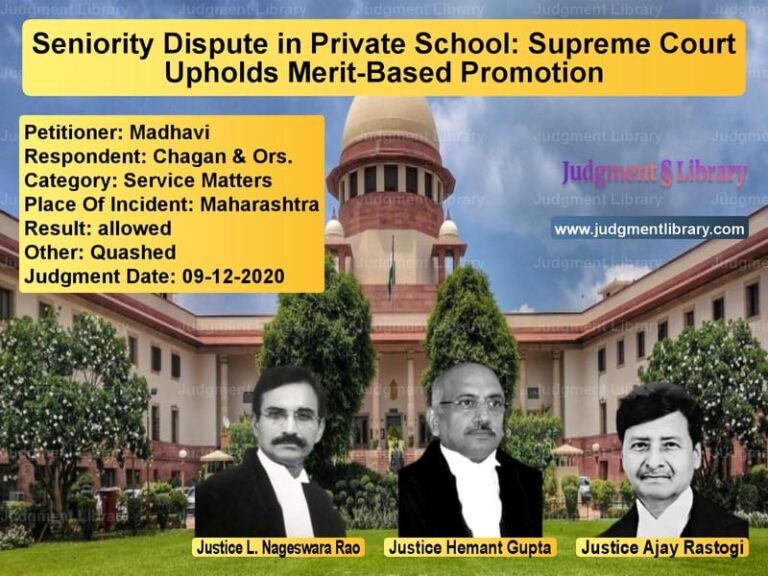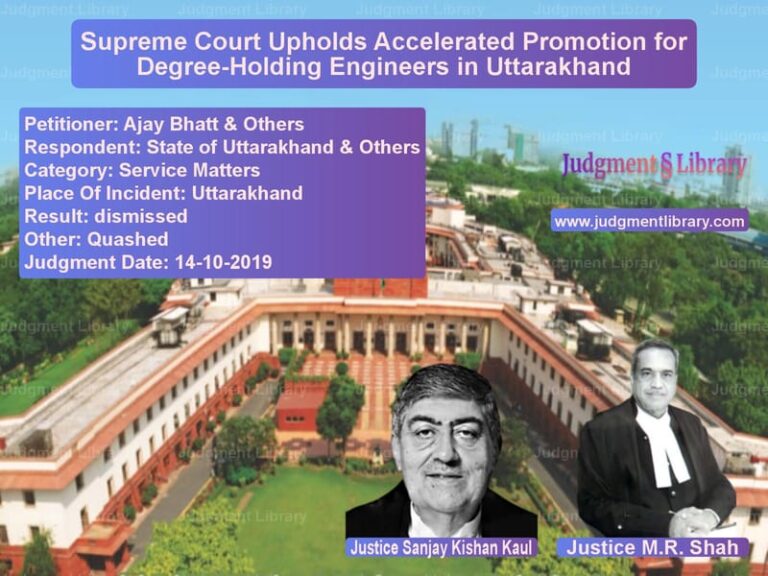NEET-UG 2024 Paper Leak Controversy: Supreme Court Rejects Retest, Orders Investigation
The Supreme Court of India recently delivered a highly anticipated judgment in the case of Vanshika Yadav vs. Union of India & Others, addressing multiple writ petitions filed in response to alleged irregularities in the NEET-UG 2024 examination. The petitioners demanded a re-test, arguing that the integrity of the medical entrance exam was compromised due to a paper leak and systemic flaws in its conduct. However, the Court rejected the plea for a retest, instead directing a thorough investigation into the malpractices.
Background of the Case
The National Eligibility-cum-Entrance Test (Undergraduate) (NEET-UG) 2024 was conducted by the National Testing Agency (NTA) on May 5, 2024. The examination took place in 4,750 centers across 571 cities, including 14 international locations. Approximately 23.3 lakh candidates appeared for the test, competing for about 1.08 lakh medical seats, of which 56,000 seats were in government medical colleges and the rest in private institutions.
The results were declared on June 4, 2024, but soon after, allegations emerged of a paper leak in states such as Bihar and Jharkhand. News reports, social media claims, and formal complaints from candidates raised serious concerns about the fairness of the examination process. Several petitions were filed in the Supreme Court, demanding a cancellation of the exam and a fresh re-test.
Key Legal Issues Considered
- Whether the alleged paper leak was systemic in nature and compromised the entire examination.
- Whether the identified beneficiaries of the fraud could be segregated from legitimate candidates.
- Whether the examination process was flawed enough to warrant a complete cancellation and re-test.
- What remedial actions could be taken to ensure justice for affected candidates?
Arguments by the Petitioners
- The paper leak was widespread and had significantly impacted the fairness of the examination.
- The leak enabled some candidates to gain an unfair advantage, making the merit list unreliable.
- There were systemic deficiencies in the way the NTA conducted the examination.
- Previous Supreme Court rulings in similar cases supported the demand for a re-test.
- The government and NTA failed to take timely action to prevent the leak.
Arguments by the Respondents (NTA & Union of India)
- The paper leak incidents were localized and did not affect the entire examination.
- The Central Bureau of Investigation (CBI) was actively investigating the leaks, and 155 students from specific centers had been identified as possible beneficiaries of the fraud.
- Conducting a re-test would be unfair to over 23 lakh students who had taken the exam in good faith.
- Data analytics conducted by the Indian Institute of Technology (IIT) Madras showed no evidence of a widespread breach.
- The 50th percentile cut-off was maintained at 164 marks, ensuring that only truly meritorious candidates were eligible for admission.
Supreme Court’s Findings
The Supreme Court carefully reviewed the materials on record, including affidavits filed by the NTA, Union of India, and the CBI. The key findings of the Court were:
- The paper leak at certain centers in Bihar and Jharkhand was confirmed but was not found to be widespread.
- The CBI investigation had identified 155 candidates who had allegedly benefited from the leaked paper.
- Statistical and data analytics reports did not show any significant anomalies in candidate scores, suggesting that the overall integrity of the examination remained intact.
- A full re-test would create chaos and uncertainty for over 23 lakh students, delaying medical admissions nationwide.
- The investigation must continue to identify any additional candidates who benefited from the malpractice, and strict action must be taken against them.
The Court ruled:
“Directing a fresh NEET-UG examination for all candidates would be replete with serious consequences, causing immense hardship to students who fairly took the test. The solution lies in identifying and acting against those who benefited from malpractice.”
Key Directives Issued by the Court
- The CBI was ordered to continue its investigation and identify all students who may have unfairly benefited from the leak.
- The Union Government was directed to conduct an independent review of the security measures adopted by the NTA.
- A seven-member expert committee, led by former ISRO Chairman Dr. K. Radhakrishnan, was constituted to recommend reforms in the examination process.
- The IIT Madras report on statistical analysis was accepted but left open to challenge by affected parties.
- Students found guilty of involvement in the fraud would face immediate disqualification and cancellation of their admission, regardless of the counseling stage.
Why the Supreme Court Rejected a Full Retest
- A retest for over 23 lakh students would disrupt the medical admission calendar and delay the academic session.
- The government presented no evidence to suggest that the integrity of the entire examination was compromised.
- Past Supreme Court rulings had held that a re-test should be ordered only when it was impossible to segregate fraudulent candidates from legitimate ones.
- The Court found that the CBI investigation was capable of identifying individual beneficiaries of the fraud.
- A blanket cancellation would unfairly penalize honest candidates who had worked hard for their results.
Future Implications and Reforms
The Court emphasized the need for long-term reforms in how national entrance examinations are conducted. Some key recommendations included:
- Stricter security measures, including blockchain-based question paper distribution.
- Decentralized exam centers with enhanced surveillance.
- Real-time tracking of question papers to prevent leaks.
- Stronger penalties for institutions or individuals involved in exam malpractices.
Impact of the Judgment
- Validation of NEET-UG 2024: The exam results remain valid, preventing disruption in medical admissions.
- Ongoing Investigations: The Supreme Court mandated further investigations to identify fraudulent candidates.
- Accountability for Misconduct: Students found guilty of benefiting from leaked papers will face strict disqualification.
- Future Examination Reforms: The Court directed the government to enhance exam security for future NEET-UGs.
Conclusion
The Supreme Court’s judgment in this case balances the interests of the vast majority of students who fairly took the NEET-UG 2024 exam while ensuring that malpractices are thoroughly investigated. By rejecting a full re-test and focusing on targeted investigations, the Court upheld the credibility of the examination while mandating systemic reforms for future exams.
Petitioner Name: Vanshika Yadav.Respondent Name: Union of India & Others.Judgment By: Justice Dr. Dhananjaya Y Chandrachud, Justice J B Pardiwala, Justice Manoj Misra.Place Of Incident: India.Judgment Date: 23-07-2024.
Don’t miss out on the full details! Download the complete judgment in PDF format below and gain valuable insights instantly!
Download Judgment: vanshika-yadav-vs-union-of-india-&-oth-supreme-court-of-india-judgment-dated-23-07-2024.pdf
Directly Download Judgment: Directly download this Judgment
See all petitions in Public Interest Litigation
See all petitions in Education Related Cases
See all petitions in Fundamental Rights
See all petitions in Judgment by Dhananjaya Y Chandrachud
See all petitions in Judgment by J.B. Pardiwala
See all petitions in Judgment by Manoj Misra
See all petitions in dismissed
See all petitions in supreme court of India judgments July 2024
See all petitions in 2024 judgments
See all posts in Constitutional Cases Category
See all allowed petitions in Constitutional Cases Category
See all Dismissed petitions in Constitutional Cases Category
See all partially allowed petitions in Constitutional Cases Category







